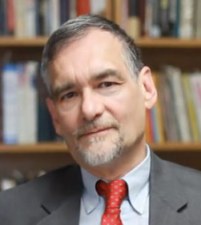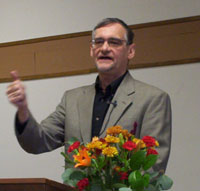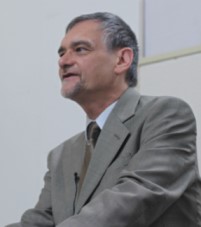Mark Weber is an American historian, author, lecturer and current affairs analyst.
He is also the director of the Institute for Historical Review, an independent, public interest educational center in southern California that works to promote peace, understanding and justice through greater public awareness of the past. In particular, the IHR strives to increase understanding of the causes, nature and consequences of war and conflict.
His many articles, reviews and essays dealing with historical, political and social issues have appeared in a variety of periodicals, and in a range of languages. Over the years he has given many lectures and interviews on US foreign policy, social-political trends in the US, and international relations. He has produced dozens of broadcast talks.
Weber has been a guest on numerous radio talk shows, and has appeared many times on television, including on the nationally broadcast “Hannity and Colmes” and “Montel Williams” shows. He has conducted countless interviews with television, radio and print journalists from across the United States, and from many overseas countries.
His main areas of specialized knowledge are US foreign policy, international relations, the Second World War, and, more broadly, twentieth-century European and American history.
Weber is a controversial public figure, and has come under fire for his work and views. Partisan “watchdog” groups, including the Zionist “Anti-Defamation League” (ADL) and the far-left “Southern Poverty Law Center” (SPLC), have maliciously attacked him with distorted and demonstrably false claims. As a result, inaccurate and misleading statements about Weber sometime appear in mainstream media outlets and generally well-regarded sources such as Wikipedia.
Mark Weber was born in 1951 in Portland, Oregon, where he was also raised. He studied history at the University of Illinois (Chicago), the University of Munich (Germany), and Portland State University, from where he received a bachelor’s degree in history (with high honors). He then did graduate work in history at Indiana University (Bloomington), where he served as a history instructor and received a Master’s degree in European history.
He lived and worked for two and one-half years in Germany (Bonn and Munich), and for a time in Ghana (West Africa), where he taught English, history, and geography at an all-Black secondary school.
During the five years he lived in Washington, DC, he carried out extensive historical research at the National Archives and the Library of Congress. In 1988 Weber testified for five days in Toronto District Court as a recognized expert on Germany’s wartime Jewish policy and the Holocaust issue. He is sometimes disparaged as a “Holocaust denier,” a label he rejects as both false and malicious.
Weber moved to southern California in January 1991 to work for the IHR. He has served as its director since 1995. For nine years he was editor of the IHR’s Journal of Historical Review.
Joseph Sobran, who for years was a nationally syndicated columnist and a National Review senior editor, spoke about Weber and the IHR at the 2002 IHR Conference:
“…If I’m ‘courageous,’ what do you call Mark Weber and the Institute for Historical Review? They have been smeared far worse than I have; moreover, they have been seriously threatened with death. Their offices have been firebombed. Do they at least get credit for courage? Not at all. They remain almost universally vilified. When I met Mark, many years ago, I expected to meet a raving Jew-hating fanatic, such being the generic reputation of ‘Holocaust deniers.’ I was immediately and subsequently impressed to find that he was just the opposite: a mild-mannered, good-humored, witty, scholarly man who habitually spoke with restraint and measure, even about enemies who would love to see him dead. The same is true of other members of the Institute. In my many years of acquaintance with them, I have never heard any of them say anything that would strike an unprejudiced listener as unreasonable or bigoted.”





